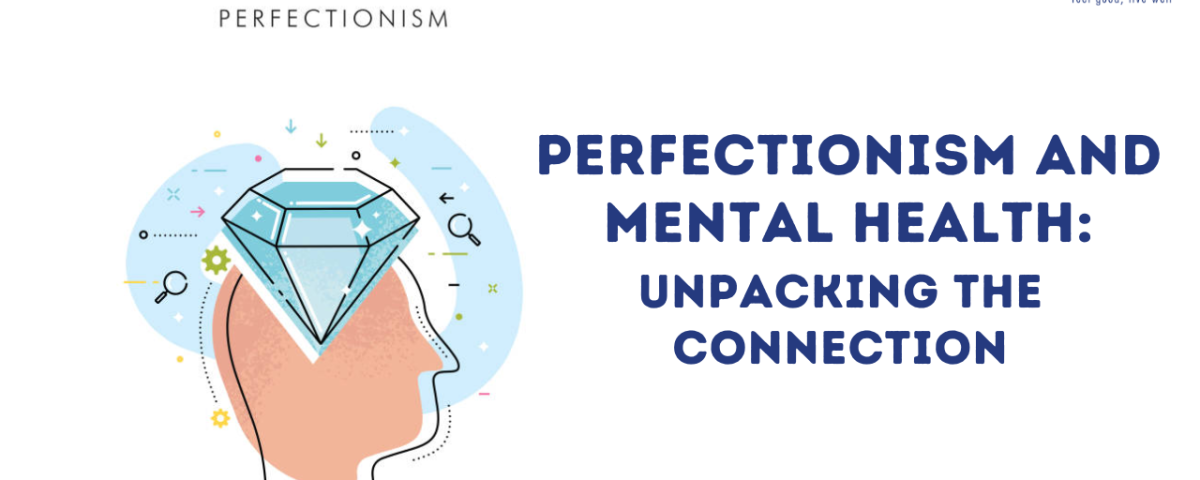Perfectionism and Mental Health: Unpacking the Connection
In the pursuit of excellence, many individuals find themselves trapped in the intricate web of perfectionism. While the desire to achieve high standards is commendable, perfectionism can have profound implications for mental health. This blog delves into the intricate links between perfectionism and mental health issues, particularly anxiety, depression, and stress. By examining research findings and exploring strategies for managing mental health in the face of perfectionism, we aim to shed light on this complex relationship and provide valuable insights for those navigating the challenges of perfectionist tendencies.
The Perfectionism Paradox
Perfectionism is often misunderstood as a positive trait, a drive for excellence and achievement. However, it’s essential to recognise the dual nature of perfectionism: adaptive and maladaptive. Adaptive perfectionism involves setting high standards while maintaining a healthy perspective on one’s achievements. On the other hand, maladaptive perfectionism is characterised by an unrelenting pursuit of flawlessness, coupled with harsh self-criticism and a constant fear of failure.
Research Findings: Perfectionism and Mental Health
A wealth of research has established a strong correlation between perfectionism and various mental health issues. One of the primary consequences of maladaptive perfectionism is heightened anxiety. Individuals who strive for perfection often experience intense fear of making mistakes, leading to chronic worry and apprehension. The constant pressure to meet unrealistic standards contributes to a perpetual state of anxiety, impacting both mental and physical well-being.
Depression is another significant mental health concern associated with perfectionism. The unattainable goals set by perfectionists, coupled with the inevitable setbacks, can lead to a sense of hopelessness and worthlessness. The relentless self-criticism and constant comparison to an idealised standard can erode one’s self-esteem, laying the groundwork for depressive symptoms.
Stress is the third pillar in the trifecta of mental health issues linked to perfectionism. The perpetual striving for perfection requires an immense amount of effort and dedication, often at the expense of work-life balance. The chronic stress resulting from the unrelenting pursuit of flawlessness can manifest in physical symptoms such as headaches, insomnia, and digestive issues, further exacerbating mental health challenges.
Strategies for Managing Mental Health in the Face of Perfectionism
Understanding the connection between perfectionism and mental health is the first step towards fostering a healthier mindset. Here are strategies to manage mental health in the face of perfectionism:
- Cultivate Self-Compassion
Embrace the concept of self-compassion by treating yourself with the same kindness and understanding you would offer to a friend. Acknowledge that perfection is an unattainable standard and that making mistakes is a natural part of the learning process.
- Challenge Negative Thoughts
Actively challenge negative and self-critical thoughts associated with perfectionism. Consider the evidence supporting and refuting these thoughts, and strive to adopt a more balanced and realistic perspective. Cognitive-behavioural techniques can be particularly effective in this regard.
- Set Realistic Goals
Establish achievable and realistic goals, breaking larger tasks into smaller, more manageable steps. This approach not only promotes a sense of accomplishment but also reduces the overwhelming pressure associated with perfectionist tendencies.
- Prioritise Self-Care
Make self-care a non-negotiable part of your routine. Engage in activities that bring joy and relaxation, whether it’s exercise, meditation, or spending time with loved ones. Prioritising self-care helps alleviate stress and fosters a more balanced approach to life.
- Seek Support
Reach out to friends, family, or mental health professionals for support. Share your struggles with perfectionism and allow others to provide encouragement and perspective. Sometimes, an external viewpoint can offer valuable insights and break the cycle of negative self-talk.
- Mindfulness and Acceptance
Embrace mindfulness practices that encourage living in the present moment without judgment. Accept that perfection is an illusion and focus on the progress you make rather than fixating on perceived shortcomings. Mindfulness can be a powerful tool in breaking free from the perfectionism trap.
- Celebrate Progress, Not Just Perfection
Shift the focus from achieving perfection to celebrating progress and effort. Recognise and acknowledge your achievements, no matter how small. Cultivating a growth mindset can foster resilience and a more positive outlook on challenges.
Perfectionism can be a double-edged sword, driving individuals towards excellence but also leaving them vulnerable to the pitfalls of anxiety, depression, and stress.
Recognising the nuanced nature of perfectionism is crucial, as it allows individuals to adopt a more adaptive approach to achieving their goals. By implementing strategies such as self-compassion, challenging negative thoughts, setting realistic goals, prioritising self-care, seeking support, practicing mindfulness, and celebrating progress, individuals can navigate the intricate relationship between perfectionism and mental health more effectively.
If you are struggling to break free from the shackles of perfectionism, CBT Professionals can help you embrace a balanced and compassionate approach to personal growth and well-being.
Coomera – (07) 5551 0251
Nerang – (07) 5668 3490
Mount Gravatt – (07) 3102 1366
If you, or someone you know, require help, please reach out to organisations like Beyond Blue.
Additionally reach out to these organisations that may be able to help.
- ReachOut (youth mental health service) — online help
- SANE Australia — call 1800 187 263
- Mental Illness Fellowship of Australia (MIFA) — call 1800 985 944
- LifeLine 13 11 14 — for anyone in crisis
(Health Direct, 2020).
If this is an emergency, please contact 000 or visit your local emergency department.
THREE CONVENIENT LOCATIONS
MOUNT GRAVATT
Mt Gravatt Medical PrecinctSE 105, 1808 Logan Rd
Upper Mount Gravatt QLD 4122


